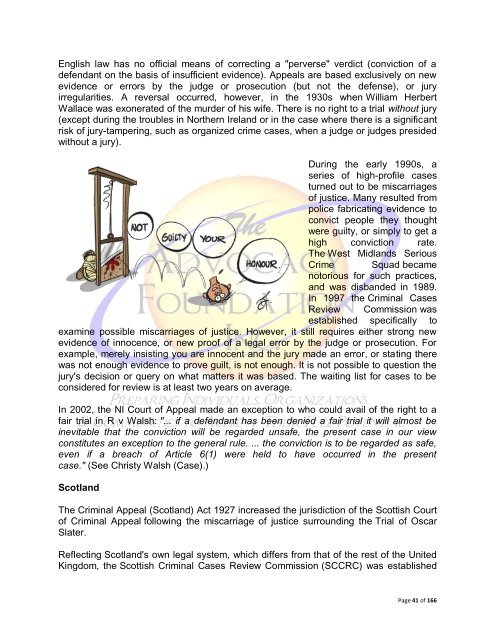You also want an ePaper? Increase the reach of your titles
YUMPU automatically turns print PDFs into web optimized ePapers that Google loves.
English law has no official means of correcting a "perverse" verdict (conviction of a<br />
defendant on the basis of insufficient evidence). Appeals are based exclusively on new<br />
evidence or errors by the judge or prosecution (but not the defense), or jury<br />
irregularities. A reversal occurred, however, in the 1930s when William Herbert<br />
Wallace was exonerated of the murder of his wife. There is no right to a trial without jury<br />
(except during the troubles in Northern Ireland or in the case where there is a significant<br />
risk of jury-tampering, such as organized crime cases, when a judge or judges presided<br />
without a jury).<br />
During the early 1990s, a<br />
series of high-profile cases<br />
turned out to be miscarriages<br />
of justice. Many resulted from<br />
police fabricating evidence to<br />
convict people they thought<br />
were guilty, or simply to get a<br />
high conviction rate.<br />
The West Midlands Serious<br />
Crime Squad became<br />
notorious for such practices,<br />
and was disbanded in 1989.<br />
In 1997 the Criminal Cases<br />
Review Commission was<br />
established specifically to<br />
examine possible miscarriages of justice. However, it still requires either strong new<br />
evidence of innocence, or new proof of a legal error by the judge or prosecution. For<br />
example, merely insisting you are innocent and the jury made an error, or stating there<br />
was not enough evidence to prove guilt, is not enough. It is not possible to question the<br />
jury's decision or query on what matters it was based. The waiting list for cases to be<br />
considered for review is at least two years on average.<br />
In 2002, the NI Court of Appeal made an exception to who could avail of the right to a<br />
fair trial in R v Walsh: "... if a defendant has been denied a fair trial it will almost be<br />
inevitable that the conviction will be regarded unsafe, the present case in our view<br />
constitutes an exception to the general rule. ... the conviction is to be regarded as safe,<br />
even if a breach of Article 6(1) were held to have occurred in the present<br />
case." (See Christy Walsh (Case).)<br />
Scotland<br />
The Criminal Appeal (Scotland) Act 1927 increased the jurisdiction of the Scottish Court<br />
of Criminal Appeal following the miscarriage of justice surrounding the Trial of Oscar<br />
Slater.<br />
Reflecting Scotland's own legal system, which differs from that of the rest of the United<br />
Kingdom, the Scottish Criminal Cases Review Commission (SCCRC) was established<br />
Page 41 of 166

















